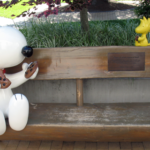In Walker Percy’s novel Love in the Ruins, the Catholic protagonist, Dr. Tom More, states no one in Louisiana bothered his family, “except for the Baptists, who don’t like Catholics no matter what.”
 Derek C. HatchWhile More’s remark was made partially in jest, it does often ring true. The recent release of Pope Francis’ second encyclical, Laudato Si’—“On Care for Our Common Home”—might provide occasion for turning over a new leaf.
Derek C. HatchWhile More’s remark was made partially in jest, it does often ring true. The recent release of Pope Francis’ second encyclical, Laudato Si’—“On Care for Our Common Home”—might provide occasion for turning over a new leaf.
Taking its name from St. Francis of Assisi’s praise hymn of all creatures, the pope describes the dangerous direction of our personal and global habits with regard to the environment.
Indeed, Francis discusses the effects of a culture of rapid technological and cultural development, pollution, global climate change, access to clean water and the loss of biodiversity. At each point, the pope defers to experts who measure and describe the ecological trends, or as Francis states, “what is happening to our common home” (paragraph 17).
Yet the issues are far larger than the environment. Let me mark three places of interest that invite Baptists to read this document—one addressed to “every person living on this planet” (paragraph 3)—closely and carefully.
The Bible teaches about creation
Francis devotes an entire chapter to the biblical basis for caring for the environment, ultimately grounding everything in a proper understanding of the doctrine of creation.  Drawing from the Genesis accounts, human beings were situated in “three fundamental and closely intertwined relationships: with God, with our neighbor and with the earth itself” (paragraph 66). Sin has ruptured all of these relationships, and “when all these relationships are neglected, … the Bible tells us that life itself is endangered” (paragraph 70).
Drawing from the Genesis accounts, human beings were situated in “three fundamental and closely intertwined relationships: with God, with our neighbor and with the earth itself” (paragraph 66). Sin has ruptured all of these relationships, and “when all these relationships are neglected, … the Bible tells us that life itself is endangered” (paragraph 70).
Hope for salvation, then, must include a hope for restoring all of these relationships together in a shared harmony. Hence, when God places humankind in dominion over all of creation (Genesis 1:28), this is not license for “unbridled exploitation of nature” (paragraph 67). Even after gifting to humanity the responsibility of caring for the created world—a stewardship we have neglected—the Bible also states clearly, “The earth is the Lord’s” (Psalm 24:1).
The dangers of relativism
Sign up for our weekly edition and get all our headlines in your inbox on Thursdays
Many cultural critics have commented on the present age of relativism, where absolute truth claims have no bearing on peoples’ lives. Without a doubt, there is a need to defend the truth of the gospel. Francis agrees with this sentiment, stating the natural environment and the social environment have suffered damage from the “same evil—the notion that there are no indisputable truths to guide our lives, and hence, human freedom is limitless” (paragraph 6).
Without truth claims such as every creature is created by God, or all humans are made in God’s image, economic practices can allow “one person to take advantage of another, to treat others as mere objects, imposing forced labor on them or enslaving them to pay their debts” (paragraph 123). We can easily hear reference to human trafficking and illegal commerce, but we also should hear echoes of practices, such as payday lending, and commodification of necessary goods, such as water and food. These are the effects of relativism, as well.
Caring for creation means caring for the poor
Finally, solidarity with the poor has been a central focus of Francis’ papacy since it began in March 2013. He has made it clear the church should be of the poor and for the poor and has taken steps to make that a reality. In this new document, he has not neglected that emphasis, noting that often wealthier nations enjoy the benefits of environmental degradation while the poor—both poorer nations and the poor within wealthier nations—bear the burdens of such activities.
Moreover, many crises in the world today have arisen because of changing climatic trends, including “environmental refugees” who have left their homes due to scarce resources and civil wars that have erupted because of extended periods of drought. For Francis, these two crises are the same. As he writes, “a true ecological approach always becomes a social approach; it must integrate questions of justice in debates on the environment, so as to hear both the cry of the earth and the cry of the poor” (paragraph 49).
In all this, the pope emphasizes personal conversion—“it is we human beings above all who need to change” (paragraph 202)—as more fundamental than technocratic solutions, even as those strategies can offer some help.
St. Francis of Assisi
This brings us back to St. Francis of Assisi, whose care for creation involved much more than words and ideas, but a spirituality that appreciated the beauty of creation. This new way of life, which the pope labels “integral ecology,” calls all of us to change the shape of our day-to-day existence so we take seriously the notion all of God’s creation is our home, but even more than that, since “everything is related, and we human beings are united as brothers and sisters on a wonderful pilgrimage, woven together by the love God has for each of his creatures and which unites us in fond affection with brother sun, sister moon, brother river and mother earth” (paragraph 92).
May we heed this call to conversion, to see our lives bound up with all of God’s creation, and to live accordingly.
Derek C. Hatch teaches theology and ethics at Howard Payne University in Brownwood, Texas.














We seek to connect God’s story and God’s people around the world. To learn more about God’s story, click here.
Send comments and feedback to Eric Black, our editor. For comments to be published, please specify “letter to the editor.” Maximum length for publication is 300 words.